|
|
|
Sort Order |
|
|
|
Items / Page
|
|
|
|
|
|
|
| Srl | Item |
| 1 |
ID:
078645
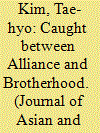

|
|
|
|
|
| Publication |
2007.
|
| Summary/Abstract |
A cost-benefit analysis leads to the conclusion that South Korea's search for non-violent responses to the North Korean nuclear issue causes a dilemma for Seoul. It must balance its security policies toward Washington and Pyongyang, and that dilemma can be resolved only when the North Korean nuclear problem, the most critical and the most difficult hurdle, is resolved. In analyzing critical variables that will determine the success or failure of the six-party talks multilateral approach, this article challenges the central tenet of cooperation theories: if a sufficient number of countries collaborate, they can achieve preventive diplomacy. Cooperation to dismantle the North Korean nuclear program will be difficult due to backsliding (`sanction busting') by concerned countries
|
|
|
|
|
|
|
|
|
|
|
|
|
|
|
|
| 2 |
ID:
089183


|
|
|
| 3 |
ID:
109216


|
|
|
|
|
| Publication |
2011.
|
| Summary/Abstract |
Contrary to the traditional thinking in political liberalism that intertwined economic interests would prevent conflict, South Korea's unilateral engagement policy with North Korea has failed to ease military confrontation, as North Korean boats have continued to cross the Northern Limit Line (NLL). In the economic crisis of the 1990s, North Korea was largely dependent on the fishery industry in order to earn foreign currency. North Korea's outdated fishing boats could not travel beyond its inland sea, but were pressured to fulfill their quota of marine product catches. As a consequence, North Korea's outdated fishing boats were likely to cross the NLL in the hope of exploiting neighboring waters near the NLL. This paper demonstrates that North Korea's NLL violations rise and fall based not on South Korea's engagement or containment policy toward North Korea, but rather on North Korea's need to catch more marine products. The views expressed here are the opinions of the authors and as such do not represent the official position of the South Korean government.
|
|
|
|
|
|
|
|
|
|
|
|
|
|
|
|
| 4 |
ID:
072072


|
|
|
| 5 |
ID:
128741
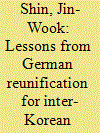

|
|
|
|
|
| Publication |
2014.
|
| Summary/Abstract |
In this article I present competing patterns of discursive reconstruction of German reunification in South Korean public spheres and the methods of mobilizing them for domestic debates on inter-Korean relations. I analyze the editorials and opinion articles of two newspapers, Chosun Daily and Hankyoreh, which respectively represent the most influential conservative and progressive print media in South Korea. The articles not only discuss German reunification in contrasting ways but also integrate those interpretive schemes into policy advocacy on North Korea. The conservatives utilized the narratives about the breakdown of the East German regime and the subsequent unification to justify an aggressive policy toward North Korea, whereas progressives consistently judged the German case as "unification by absorption," giving full support to reconciliation and peaceful coexistence.
|
|
|
|
|
|
|
|
|
|
|
|
|
|
|
|
| 6 |
ID:
174855


|
|
|
|
|
| Summary/Abstract |
Can positive domestic messages generated by a foreign policy of engagement toward another country change public views regarding that state? How resistant are such changes to events that contradict the positive messages? I argue that while positive government messages about an adversary can significantly improve public opinion, highly consequential foreign policy events that contradict the messages influence public opinion at the cost of elites’ ability to shape it through their messages. Such differing effects can lead to a polarization of opinion when the content of the messages and the nature of events diverge from each other. Leveraging the unpredictability of North Korea’s foreign policy behavior, the South Korean government’s sustained policy of engagement toward it during the years 1998–2007, and North Korea’s first two nuclear tests to examine the relative impact of consequential foreign policy events and elite messages on public opinion, I find strong evidence consistent with this argument.
|
|
|
|
|
|
|
|
|
|
|
|
|
|
|
|
| 7 |
ID:
193631


|
|
|
|
|
| Summary/Abstract |
This study uses leadership trait analysis to examine the link between personality and policy regarding South Korea’s Sunshine Policy toward North Korea and demonstrates that Kim Dae-jung’s personality characteristics largely accounted for this policy’s content, process, and outcome. With an analytical focus on the decision-making system, this study finds that Kim’s formal model was characterized by a control deemed inherently more indirect, subtle, and socialized than direct, personalized, or outright. Specifically, this type of control can be attributed to Kim’s personality traits, such as a persistently high need for power and relationship focus, along with other idiosyncratic style variables, such as disinclination toward interpersonal conflict, a sense of efficacy, and a sophisticated cognitive quality. President Kim’s resulting management style had the effect of empowering members of his advisory group and invigorating the policy process. In addition, the president’s trusted chief of staff, who served as a competent and thoughtful custodian manager with substantial authority, helped manage the system effectively and enhanced its stability. The study concludes that Kim Dae-jung’s management style, incorporating socialized control over decision-making, combined with his advocate leadership style in implementation (marked by a relentless push for his rapprochement agenda and a tendency to challenge constraints indirectly), helped accelerate the overall policy process. This contributed to the improvement of inter-Korean relations during his presidency.
|
|
|
|
|
|
|
|
|
|
|
|
|
|
|
|
| 8 |
ID:
121734
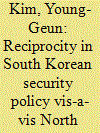

|
|
|
|
|
| Publication |
2013.
|
| Summary/Abstract |
I review the principle of reciprocity in South Korean security policy with regard to North Korea and the United States and analyze how the principle fits with US security policy concerning South Korea. Diffuse reciprocity shaped Korean security policy starting with President Kim Dae-jung's Sunshine Policy. The Lee Myung-bak government's hard-line approach increased military tension and economic anxiety on the peninsula. The new South Korean government under Park Geun-hye should devise achievable policy measures rather than place excessive pressure or unrealistic demands on North Korea.
|
|
|
|
|
|
|
|
|
|
|
|
|
|
|
|
| 9 |
ID:
125250
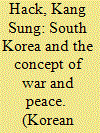

|
|
|
|
|
| Publication |
2013.
|
| Summary/Abstract |
does Confucianism account for any part of the perceptions of international politics that Korean possess? if it does, then how significant has its influence been on the historical process of the conceptual formation of Korean's concepts of war and peace? first learned over two millennia ago, Confucianism finally become the sole ruling ideology under the Joseon Dynasty. Ever since, Confucian virtues moralistic approach, education of men, and family like international order with the middle kingdom at the centre, among many played dominant roles in Korean domestic politics as well as it foreign relations (Sino-Korea relations, almost exclusively). what seemed to last forever in East Asia, however confronted a massive challenge an the fate of Koreans was not exception. Korea's bandwagoing strategy within the Confucian world order could not function nay more with the advent of the age of imperialism and the subsequent foreign penetrations.
|
|
|
|
|
|
|
|
|
|
|
|
|
|
|
|
| 10 |
ID:
020524


|
|
|
|
|
| Publication |
Fall/Winter 2001.
|
| Description |
121-146
|
|
|
|
|
|
|
|
|
|
|
|
|
|
|
|
| 11 |
ID:
156475
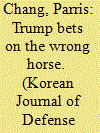

|
|
|
|
|
| Summary/Abstract |
North Korea’s pursuit of nuclear arms, and the U.S. effort to stop it, date back to the
1990s. In mid-1994, the United States was ready to use force—to launch a surgical
strike with cruise missiles on the North Korean reprocessing facility at Yongbyon,
which produces plutonium–the material for the nuclear bomb. At the last minute,
North Korea’s leader Kim Il Sung invited former U.S. president Jimmy Carter to
Pyongyang to salvage the crisis. Thereafter, the United States and North Korean
officials met in Geneva and worked out a deal, the Agreed Framework, in December
1994, thereby Pyongyang agreed to suspend its plutonium program, while the
United States, the ROK and Japan would build two light-water reactors for North
Korea to generate electric power. The Americans find North Korean officials
skillful in deception and duplicity, which is rather difficult to deal with. In spite of
their public commitments, the North Koreans are determined to possess nuclear
arms and find ways to continue their quest. They also excel in brinkmanship—they
provoke and make trouble, and then extol concessions/rewards for cooperation.
President Donald Trump, much like his predecessors, erroneously believes that
China is willing and has the economic leverage and political influence to rein in
Pyongyang’s leadership. Hence, Trump has tried to “outsource” North Korea’s
nuclear threat to Chinese leader Xi Jinping in the wake of their summit meeting in
April. Trump has offered a better trade deal to China, but Xi has been reluctant–
to White House officials, Trump’s “bet” is not paying off. As the threat perception
of China and the United States is different, and the interest and agenda of the two
nations in the Asia–Pacific are also vastly different, Xi cannot be expected to do
Trump’s bidding on North Korea. Xi’s primary concern is to prevent U.S. military
attacks on North Korea that would result in the collapse of Kim Jong Un’s regime,
and a pro-U.S. government in North Korea. Nor does Xi want to implement heavy
sanctions on Pyongyang which could destabilize Kim’s regime and drive hundreds
of thousands of refugees into China.
|
|
|
|
|
|
|
|
|
|
|
|
|
|
|
|
|
|
|
|
|